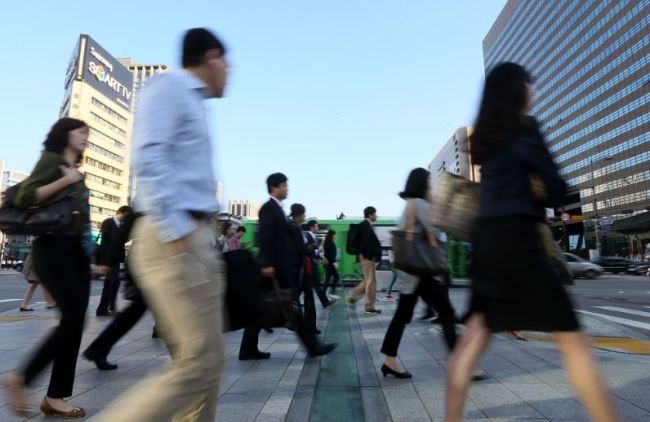http://www.koreaherald.com/view.php?ud=20180301000137&ACE_SEARCH=1
South Korean workers have expressed mixed feelings towards the passage of a revised bill through parliament that aims to shorten working hours, with some citing positive improvements in their work-life balance while others fear a cut in wages.
On Wednesday, the National Assembly passed a revision to the Labor Standards Act that calls for reducing the country's maximum statutory working hours to 52 hours a week from the current 68 hours.
Under the revision, working hours per week will be limited to 40 hours of weekday work and up to 12 hours of overtime work. Working on a holiday or weekend will all be counted as overtime.
People working at major large companies and public officials mostly welcomed the bill's passage, saying that they can now find better balance to enjoy activities outside the workplace.
 |
| (Yonhap) |
Already, some large companies have reduced working hours, including retail giant Shinsegae Group, which operates Shinsegae department store and E-Mart hypermarket chain.
The company said workers are being encouraged to utilize their time more effectively, claiming reduced working hours allow people to spend more time with their families and engage in other activities, such as exercise. Such "off time" can help people be more productive at work and lead to gains for the company.
"I head to the gym every day after work these days," said a 37-year-old Shinsegae employee who asked not to be named. "I now can have a normal life."
According a report by the Organization for Economic Cooperation and Development, South Koreans worked an average of 2,069 hours in 2016, 305 hours more than the average of 1,764 hours.
Other major firms have followed suit, including tech firm LG Electronics Inc. and chipmaker SK hynix Inc., which have launched a pilot program that allows workers to work less than they did even before the passage of the bill.
A number of IT firms have also allowed their workers to choose flexible working hours, in line with efforts to provide more leisure time for employees The flexible working system allows employees to choose their work hours on a daily and weekly basis so that they can handle personal affairs, such as looking after children, taking part in leisure activities or pursuing hobbies.
Meanwhile, those working at small-and-medium sized firms have showed concerns, fearing that curtailed working hours may lead to reduced wages.
These workers claim shorter working hours may lead to reduced overtime pay, saying that the payment gap between large and small companies will become more pronounced.
"I think that my wage will probably be reduced by one third if my company adopts reduced working hours," said a 54-year-old employee, surnamed Lee, who works for a small welding business.
According to a report by the Korea Economic Research Institute, companies with between 30 and 299 employees, and those with more than 300, are forecast to scale back 0.4 percent and 0.9 percent, respectively.
Others have also showed concern over the possibility that the change would impact their work intensity, as they are required to maintain the previous level of productivity while putting in less time at work.
Reflecting this view, there are quite a few workers who argued that the shorter workweek will not noticeably improve the general quality of life unless the company hires more employees.
Companies for the most part have held negative views of shorter working hours and have not moved to increase their workforces.
Shortening working hours was one of President Moon Jae-in's key campaign pledges aimed at helping to improve workers' quality of life and help create jobs.
To cushion the possible impact from the reduction, the revision will be applied in stages. It will be applied to companies with 300 or more workers on July 1, while firms with 50 to 299 workers and those with five to 49 workers will be subject to the new rule starting Jan. 1, 2020, and July 1, 2021, respectively.
The number of business types exempt from the working hour limits will be curtailed from the previous 26 to five involving transportation services and health care. (Yonhap)






 Long-outlawed labor union of civil servants wins govt. recogn...
Long-outlawed labor union of civil servants wins govt. recogn...
 MeToo movement having lasting impact on South Korean society ...
MeToo movement having lasting impact on South Korean society ...
